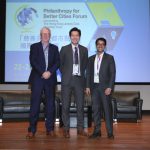Speakers:
- Gaurav Gupta Regional Director, Dalberg Global Development Advisors
- Jeremy Nicholls Chief Executive, Social Value UK
Facilitator:
- Jonathan Chang Executive Director, Lien Centre for Social Innovation
What do companies and philanthropists gain from philanthropic engagement? Beyond their desire to further the causes important for their work and to spark public interest in certain social issues, philanthropic funders are also seeking alternative ways of promoting their businesses.
From a funder’s perspective, three elements were cited: 1) a strong hypothesis development, ie am I funding the right thing?; 2) a highly iterative design, including rapid prototyping; and 3) a push for real-time measurement for learning and decision making whether to cut, continue to fund, or help scale up. From a grantee’s perspective, elements for consideration include: 1) going for the small plan first to prove you can be trusted; 2) demonstrate you have learned from other similar projects; 3) asking for funding for user-testing; 4) pushing for flexibility in funding.
Mr. Nicholls offered a decision tree to systematically measure, evaluate, and use social value, which are rigorous across projects. He however also advocates for not getting bogged down with the process but using the results as means to be lean and agile. He warned against being “perfect” and encouraged measurement to be “good enough” to make informed decisions on philanthropic projects.
Meanwhile, Mr. Gupta pointed out that many of his clients ask “where can I make the most impact?” which to him is the wrong question. Rather, it should be “where is my excellence, and where can I use my experience/strength to create impact.”
Both panelists were asked about their views on risks. Mr. Nicholls clarified that one needs to be clear if it is a risk that the social impact may not materialize or if the project may not work. He encouraged philanthropists to be clear in their minds which risks they are taking and what returns (or impacts) they are seeking to achieve in the first place. Mr. Gupta added that philanthropic funders must embrace risks and failures as part of the process.












